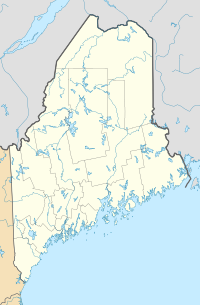Maine
Nicknamed "the Pine Tree State," Maine is located in the New England region of the Northeastern United States. It is bordered by the Atlantic Ocean, New Hampshire, Quebec and New Brunswick. Maine is home to Acadia National Park.
The Constitution of Maine is the basic governing document of the state of Maine. It structures Maine's state government and is composed of three equal branches — the executive, legislative and judicial branches. Maine has two members of the U.S. Senate, two members of the U.S. House of Representatives, 153 members of the House of Representatives and 35 members of the State Senate.

Maine 2024 elections: U.S. Senate • U.S. House • State Senate • State House • State ballot measures • Candidate ballot access
Maine elections, 2025 Past elections: 2023 • 2022 • 2021 • 2020 • 2019 • 2018 • 2017 • 2016 • 2015 • 2014
Cities and counties in Maine
Ballotpedia provides comprehensive election coverage in the 100 largest U.S. cities by population and also covers mayoral, city council, and district attorney elections in every state capital. Additionally, Ballotpedia covers school board elections in the 200 largest U.S. school districts by enrollment.
Maine fact checks
Policy issues in Maine
Budget: Budget and finances • Taxes
Civil liberties: Affirmative action • Campaign finance • Nonprofit regulation
Education: Charter schools • Higher education • Public education • School choice
Election: Ballot access requirements • Redistricting • Voting
Energy: Energy information • Fracking
Environment: Environmental information • Endangered species
Finance: Financial regulation information
Healthcare: Healthcare information • Medicaid spending • Effect of the Affordable Care Act
Immigration: Immigration information
Pensions: Public pensions
Influencers in Maine
Influencers are power players who help get candidates elected, put through policy proposals, cause ideological changes, and affect popular perceptions. They can take many forms: politicians, lobbyists, advisors, donors, corporations, industry groups, labor unions, single-issue organizations, and nonprofits, to name a few.


